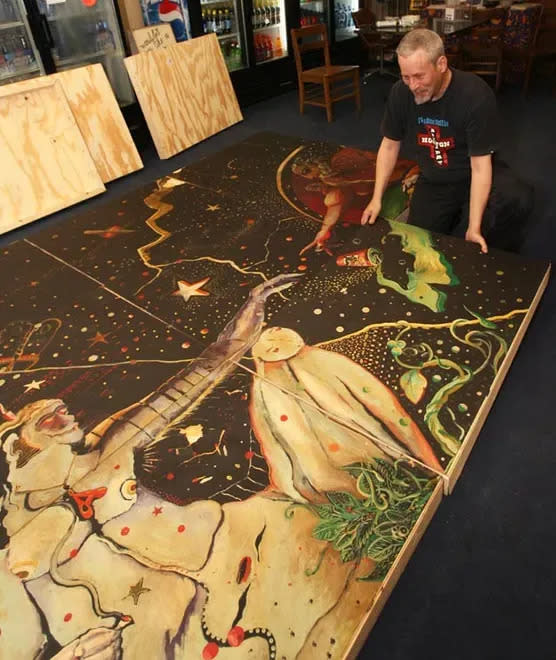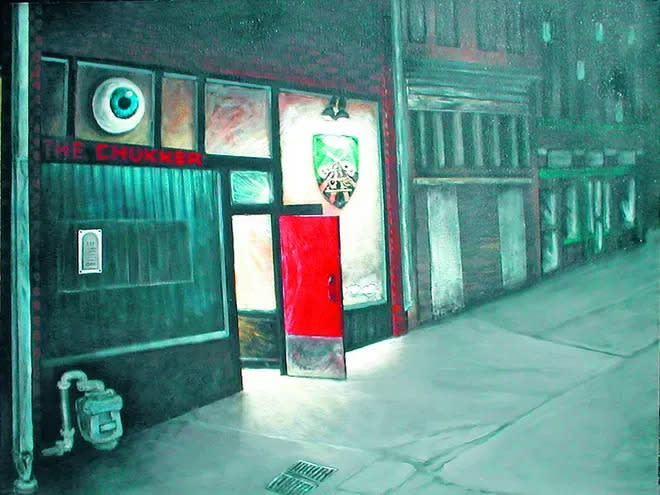Remembering the Chukker, an eccentric third place, 20 years gone | MARK HUGHES COBB
Lots of folks hyping the Chukker Weekender, Oct. 27-28 at Druid City Brewing Co., and probably many more wondering What? Why? For a 20-years-now-defunct bar?
Nah. For the Third Place.
More: Anticipation is at least one-quarter of the joy of any event | MARK HUGHES COBB
That's the sociological construct for other spots, outside home and work, those locales you're forced to inhabit. Third places are those you choose to breathe in, where you can stretch out, become more yourself, or even someone else, depending on mood. Places you go where you didn't know they had that thing you always wanted, because you didn't even know you'd always wanted it until you blew in those doors of perception.

Theaters, clubs, libraries, bookstores, coffee shops, cafes, parks, churches .... During the height of the pandammit shutdowns we all felt loss of third places. Most were shut, by fiat, by law, or by smart health choice. Some of us learned "remote work" was more than an EPCOT-themed fantasy, and more a template for today. Third places became second/thirds, for some, long as they possessed good Wi-Fi.
Tuscaloosa's richer than ever with third-place options, even with University Mall increasingly shuttered and shutdown early, McFarland Mall a distant memory, some wide-open plots of land still seeking tenants, investors or ideas, and current and future third-place hives — commingling shopping, dining, entertaining, residence and the ineffable hangout vibe — facing outward, rather than the old mall idea of inward, roofed and carpeted.
Outdoor centers' benefits fade in rain, though, which, despite rarity this summer, will return, as it has earlier this week. Pushed indoors, the average third placer's going to land on one and stick, rather than wander protected halls, communing with shoes and videogames, grasping books to thumb, pretzels to gnaw.
Soon we'll have PopStroke, which despite forgetting to plant 16-foot red-eyed devil monkeys or looming Easter Island heads to whack your ball down the gullets of, should still draw, with probably more development fallout.
A multiplex theater — which University Mall was rightly drubbed for excluding from its plans back when; New Coke, anyone? — offers flexibility and possibility, enough for a family to meander and third-place for hours.
But that doesn't mean we should lose the grandiosity of the Bama Theatre, a palace.
We're blessed with indie bookstore Ernest and Hadley, staffed with lovers of the written word, lovingly tended and patronized. But, at the same time, I don't want to give up the later hours, the room to waste in Barnes and Noble's cafe.
Tuscaloosa has clubs galore, enough the city's actually slammed down a moratorium on approving new ones. There are loads of fine places even a boring old grownup like me could meet pals for a cocktail: Alcove, Loosa Brews, Catch 22, Avenue Pub, Sessions, just to name a few. But becoming a real third place is like catching lightning in a jar.
Powers-that-be seem to recognize that not every new development need be profit-oriented — though it'd behoove them to work that in, for practical reasons — and that some things just need to be, because people dig 'em. Call it experience economy, or quality of life, or just, you know, happiness, but even those of us hard-grown from the rocky soil of protestant-capitalist pragmatism know that life can't be all work, rest, get up and do it again.
What is life? Why is it? Why share, and play, and communicate? What's a meta for?
We could try to divine The Chukker as a long-time joint -- started in 1956, closed Halloween 2003 -- whose porous, towering walls soaked up by osmosis not just scads of painted junglescapes, band names and logos, graffiti of the bizarre and perilous kind, but voices in laughter and debate, anger and derision, love and acceptance; music from the weirdest abstracted ear-vibrations to the one-two-three-faw! purely primal heartbeat of the soul.
With those walls down, it's a state of mind, one best re-lit by gatherings.

At its closing, people tried to put it into words: Home to ".... an assortment of eccentrics, including blue-collar workers, students, professors, bikers, gays, itinerant musicians, lawyers and the odd journalist or two. In short, The Chukker Nation," said Tommy Stevenson. D.C. Moon wrote in his old myspace.com blog: "It was the first place that both blacks and whites could drink together here. They fielded softball teams, parade floats and became a force for change in a city that, without the University, would just be another backwater Alabama river town."
![D.C. Moon and His Atomic Supermen perform at the Chukker in Tuscaloosa in this 2003 file photo. [Staff file photo]](https://s.yimg.com/ny/api/res/1.2/xrfbjlJT7E7i5B5_oTFOhQ--/YXBwaWQ9aGlnaGxhbmRlcjt3PTk2MDtoPTExNzE-/https://media.zenfs.com/en/the-tuscaloosa-news/4f54ab49dd98f647b506afa0841d795d)
Tuscaloosa News forum members: "It had always been an oasis of tolerence in a sea of conservative thought and ways of life. ... bikers, gays, writers, artists, musicians, professors, accountants, drunks and just about every thing else in between. ... the Chukker was the only place in Tuscaloosa where one could go on just about any night and get into an intellectual conversation." "A place where there were no Democrats or Republicans. We were Chukker Nation where the world's problems were forgotten after dark or solved before daylight. What a mixing bowl of Americana."
I tried to catch it this way: "What the Chukker had was heart, a seemingly indefatigable, willful, colorful, loving heart, with expansive room for all God's chilluns: black, white, gay, straight, artist, musician, dancer, foosballer, pool shark, biker, Toyota-driver, punk, freak, hippie, hip-hopper, Bruce Hopper...."
For me, the Chukker was, like most third places, numerous things, innumerable facets, among them a welcoming stage, where around 3 a.m. I'd dip my steel-and-oil stained fingers into a wide-mouth foam of Guinness, to relieve the pain, the cramps. Then we'd get up and play one more hour for that last wave of other-restaurant/club employees who'd just rolled in, ready after their shifts to be in that place where nobody cared who you weren't.
Reach Tusk Editor Mark Hughes Cobb at mark.cobb@tuscaloosanews.com.
This article originally appeared on The Tuscaloosa News: Remembering the Chukker, gone 20 years | MARK HUGHES COBB

